9 great new board games from Origins 2018
The best of this summer's crop of board games in convenient list format.
Origins Game Fair is the premier early summer tabletop convention in the US, and here in gaming’s new golden age that means it has new game releases, announcements, and previews aplenty. I came back from that feast of games with a lot of playtime under my belt, so I’m ready to go over what I think were the best, most interesting, and most promising games games of the convention. Some of these are destined to join the ranks of the best board games, and most of them are either already out or coming soon. Here's the cream of the crop.
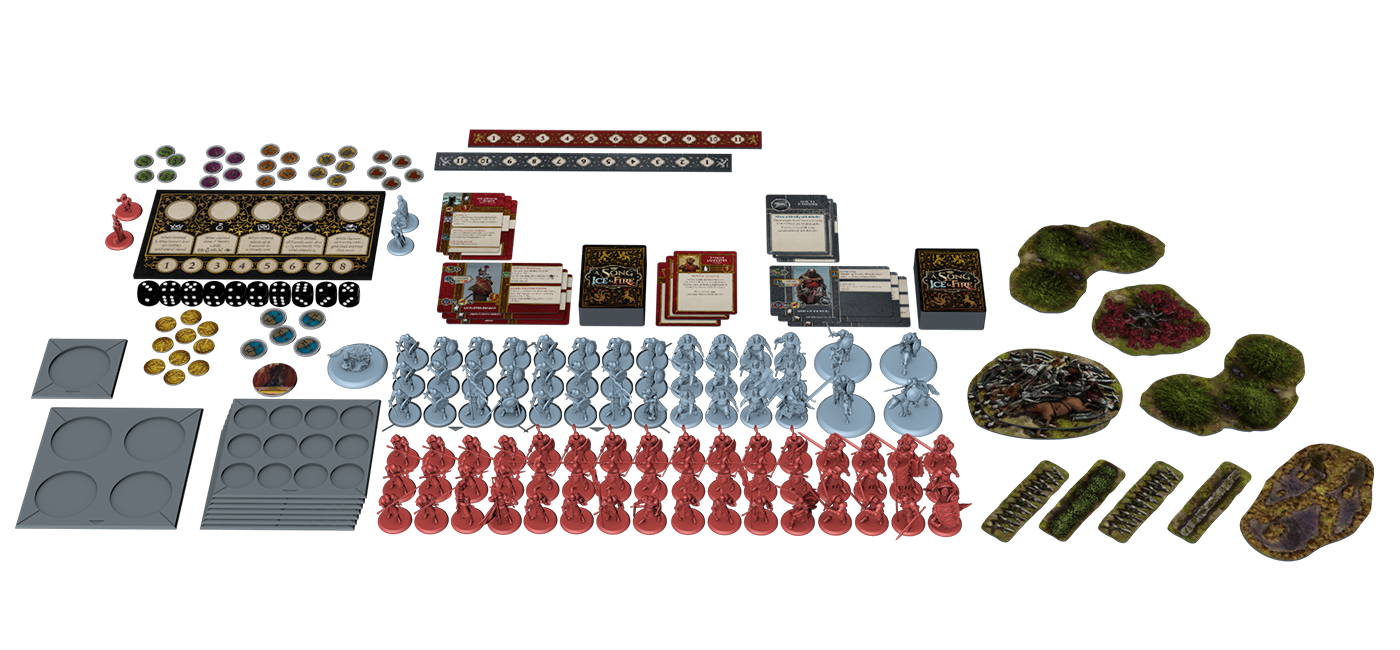
A Song of Ice & Fire: The Miniatures Game
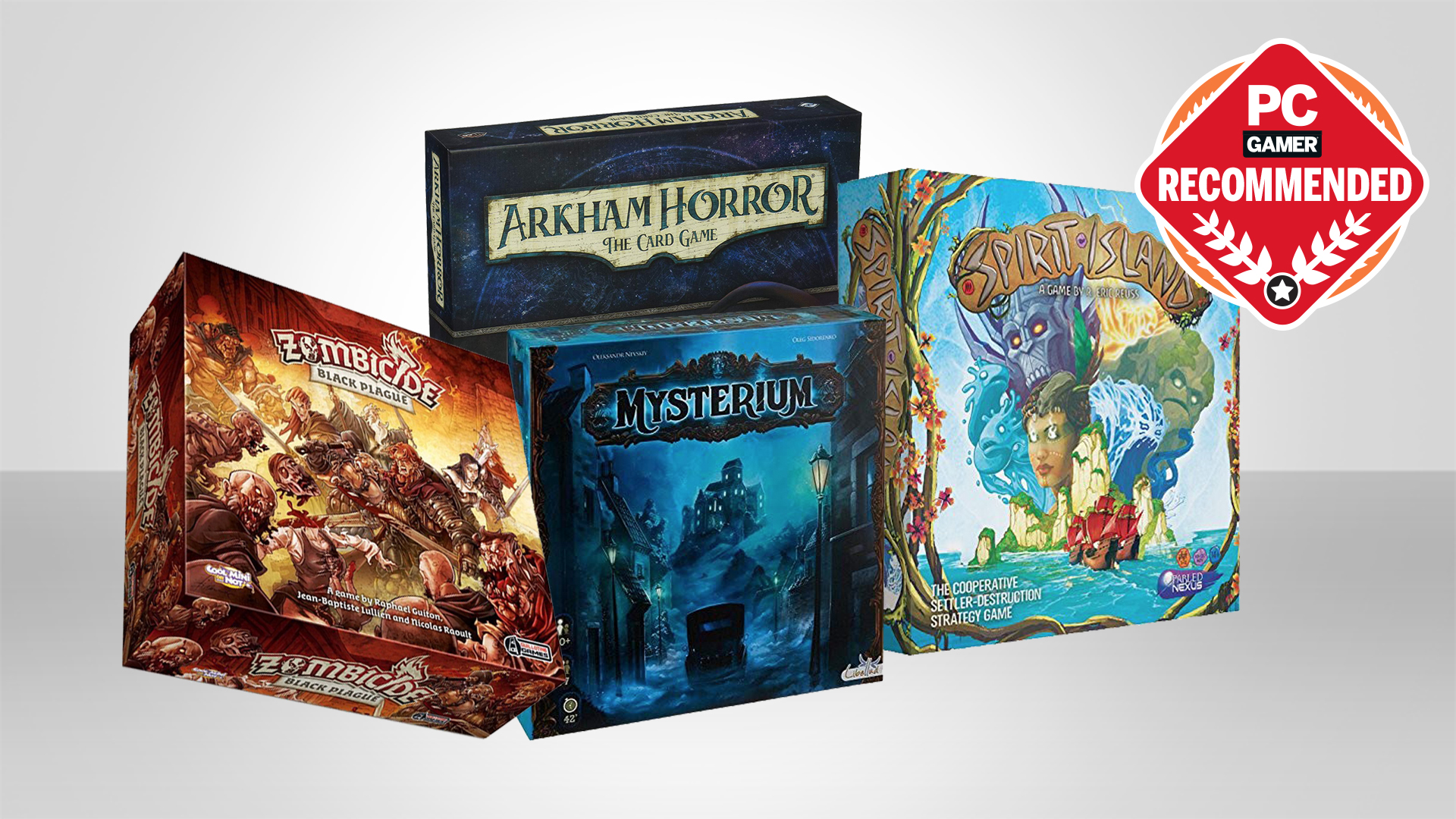
The best board games
Best cooperative board games
The best ways to play board games on PC
The 5 best solo board games
Available: It’s produced, but in transit, so expect it in stores August at the soonest.
Despite a decent design pedigree and a highly successful Kickstarter, I was skeptical going into my demo of A Song of Ice & Fire because, to be very frank, the quality of licensed games tends to scale inversely to the popularity of the property. I was pleasantly surprised to find a fast-playing miniatures game with modern design sentiments for those who’d rather not get bogged down in the minutiae of Warhammer: Age of Sigmar or Kings of War.
Units had straightforward, easily parsed stats, simple keyword-driven special powers, and straightforward movement rules. The game also has non-combat intrigue units, characters from the George R.R. Martin books like Cersei Lannister, who do things like rally your troops or demoralize the enemy. Perhaps the best part was the excellent movement trays and accompanying mechanics, allowing for you to easily remove and add models to a unit—something lots of powers did. It meant the design really accommodated comebacks and added an ebb and flow to the battle, which meant that you were never really out of the game completely until the last sword was swung. A welcome alternative to the slow death spiral of similar unit-based games like Warhammer Fantasy Battles.
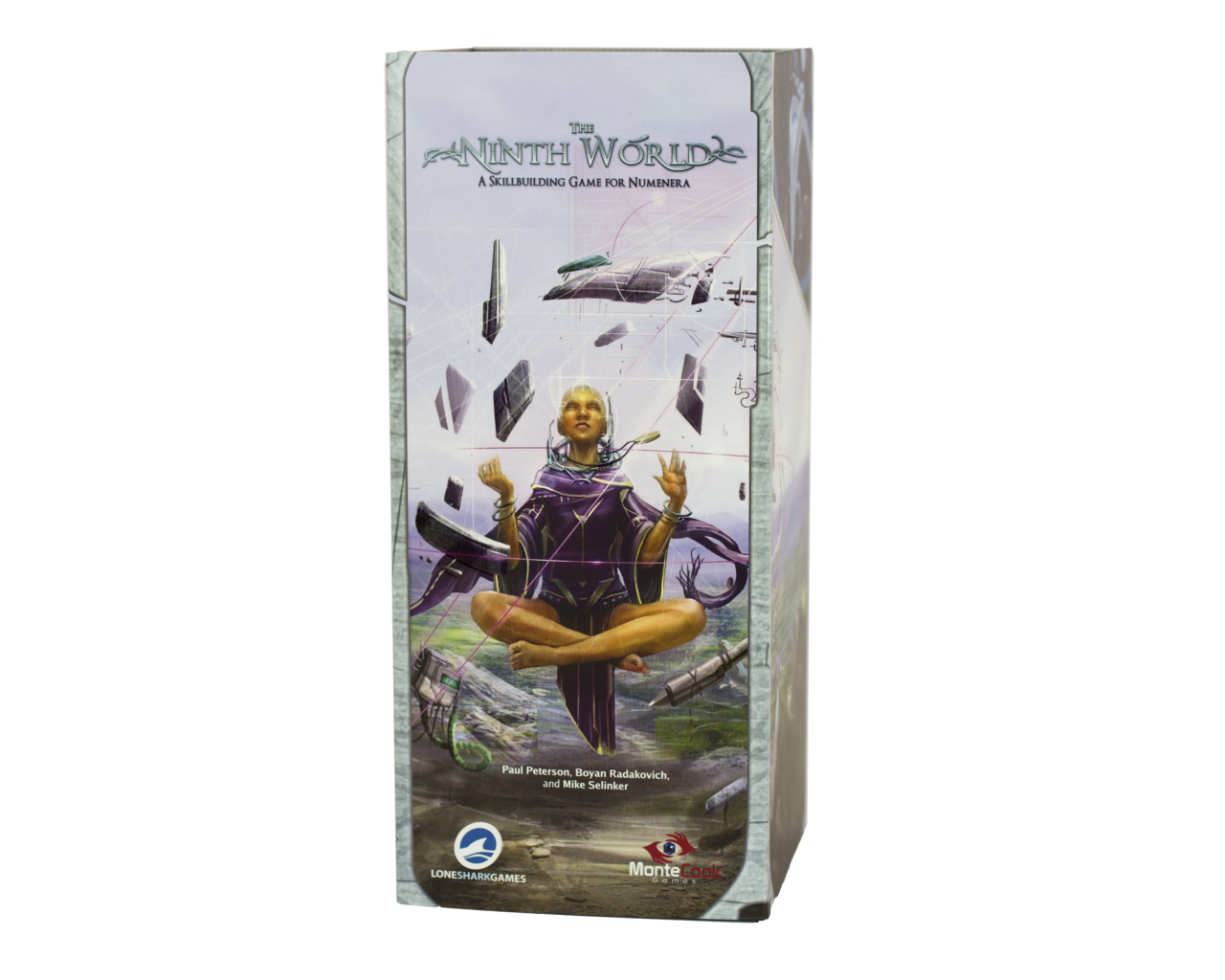
The Ninth World
Available: Out now.
Based on the Numenera world (of tabletop roleplaying and Torment: Tides of Numenera fame), The Ninth World is a journey into the weird world via a relatively strange and new, yet pretty approachable, “skillbuilding” mechanic. Like a strange blend of tech tree and deck builder, The Ninth World has you managing and upgrading a set of cards, but unlike most deck builders the composition of those cards never changes. Each player takes on a character in either cooperative or competitive play—either way they bid on actions to take on the center field, two rows of either “town” or “adventure” cards. The first person to bid on an action, then take it, wins that quest, item, or fight against a monster. It’s a game that encourages you to play multiple times in succession, as it rarely takes more than an hour. Those who like (tabletop) adventure games and card games will be interested.
Oh, and it has a solo mode that seemed quite good, though I didn’t get to play it. We’ll see if it’s in competition for the best of solo board games list when we get our hands on a copy.
Keep up to date with the most important stories and the best deals, as picked by the PC Gamer team.
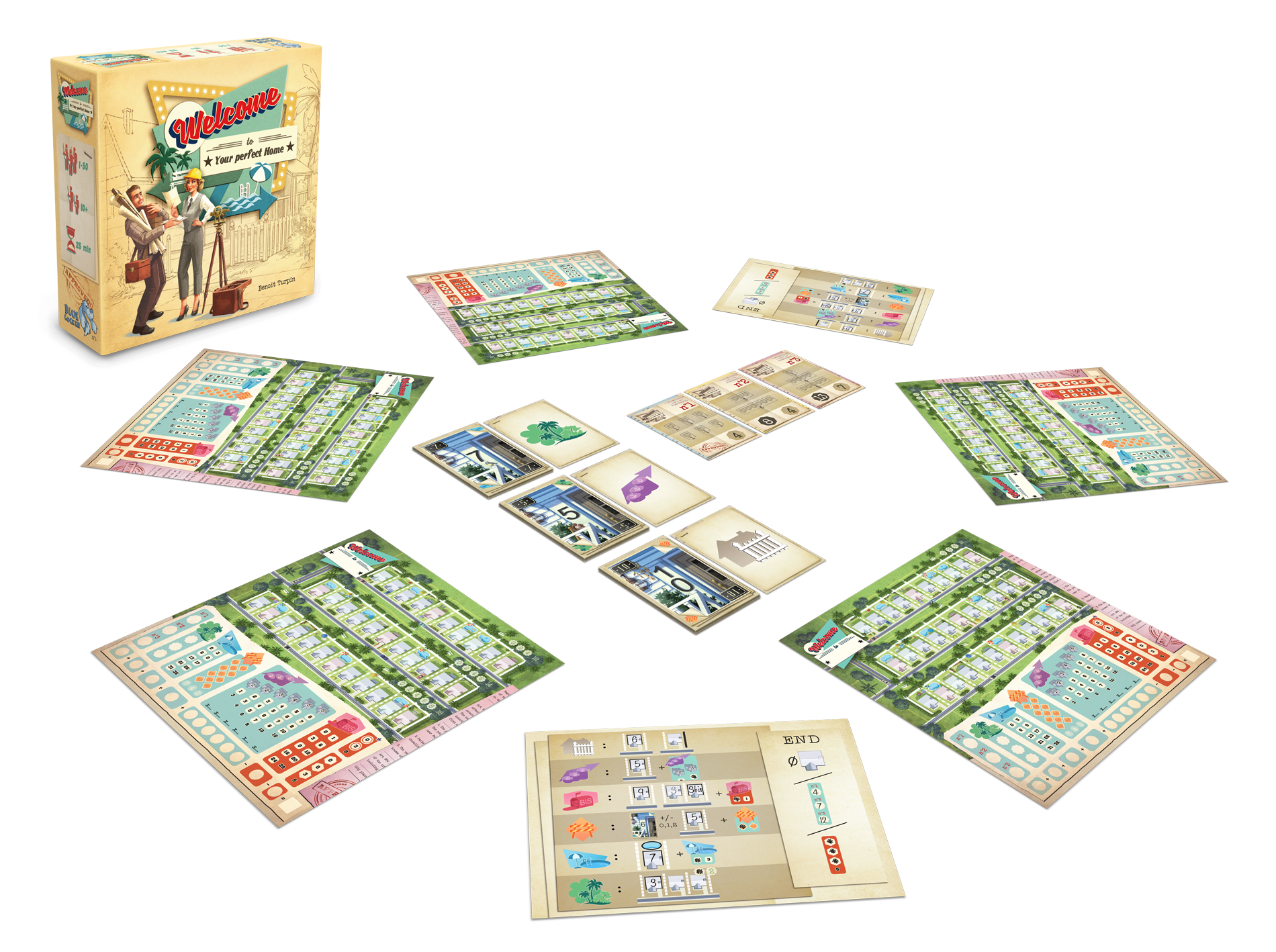
Welcome To...
Available: Preorders ship in July ahead of an August 2018 release.
A cute little roll-and-write game about building a 1950s suburb, Welcome To… made an impression on me because it was so daggum simple and quick to play. Each turn players choose one of three houses to add to their neighborhood, pick where it’s going in their neighborhood, and enact a simple special power based on the card they chose—something like building a pool, erecting some fences, or fudging the house numbers a bit. Entirely simultaneous, players always chose from the same set of houses, meaning everyone was on equal footing the whole time and had the same opportunities over the course of the game. The game is in puzzling out how to make the most of what comes to you, and figuring out which of the game’s multiple scoring conditions is right for you. Do you shoot the moon and get as many pools in your neighborhood as possible, or do you go for objectives and fence in the right groups of houses to get bonus points?
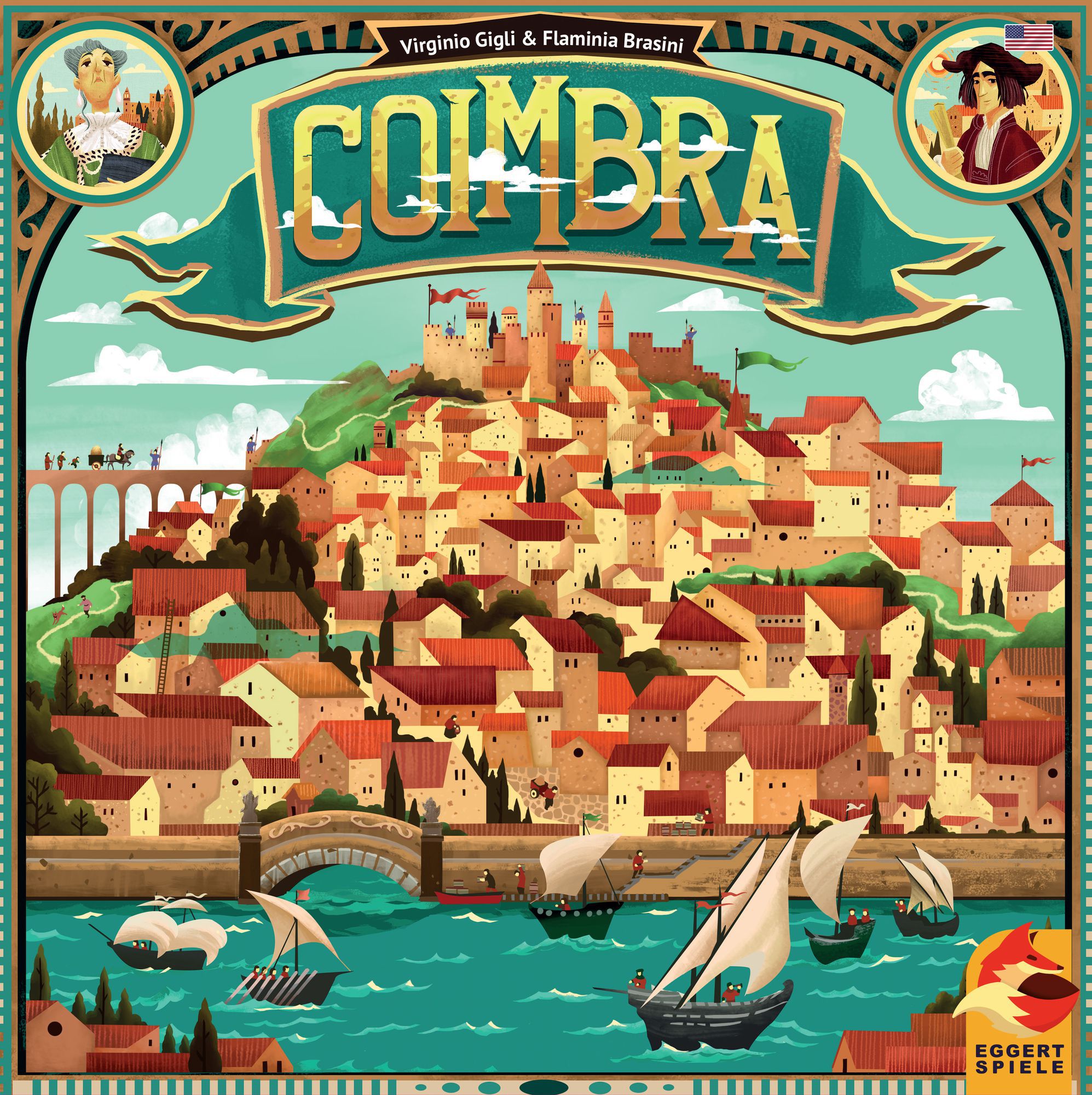
Coimbra
Available: Ships August 2018.
Design team Flaminia Brasini and Virginio Gigli are known for their series of dice placement games, where you place workers to carry out actions, but the quality of those workers varies because they’re dice you roll each time. Coimbra feels like the absolute culmination of the last few years of their work. It combines the mechanics developed separately in The Grand Austria Hotel, Lorenzo il Magnifico, and The Voyages of Marco Polo into a single monster game with all the bells and whistles you could wish for out of a strategy game.
Each player is the head of a powerful family in the city of Coimbra during the Age of Discovery. Your job is make your family stronger by funding trade expeditions, building up your power base, and strengthening relations with influential and powerful monasteries. Each round the players roll a huge pool of dice, then use those dice to bid for position on certain action spaces. Those actions do things like get you points, increase your influence, and make you wealthy, allowing you to spend resources on further actions later down the line. They also give you bonuses for choosing certain kinds of cards, or colors of dice, or new scoring conditions for the end game. It’s a layer cake of a game, with each section of the design interlocking with another section in an absolutely mind-blowing cycle of complexity and feedback. I highly recommend playing it at least once—though it was clear from even a short demo that no two games of Coimbra will ever be the same.
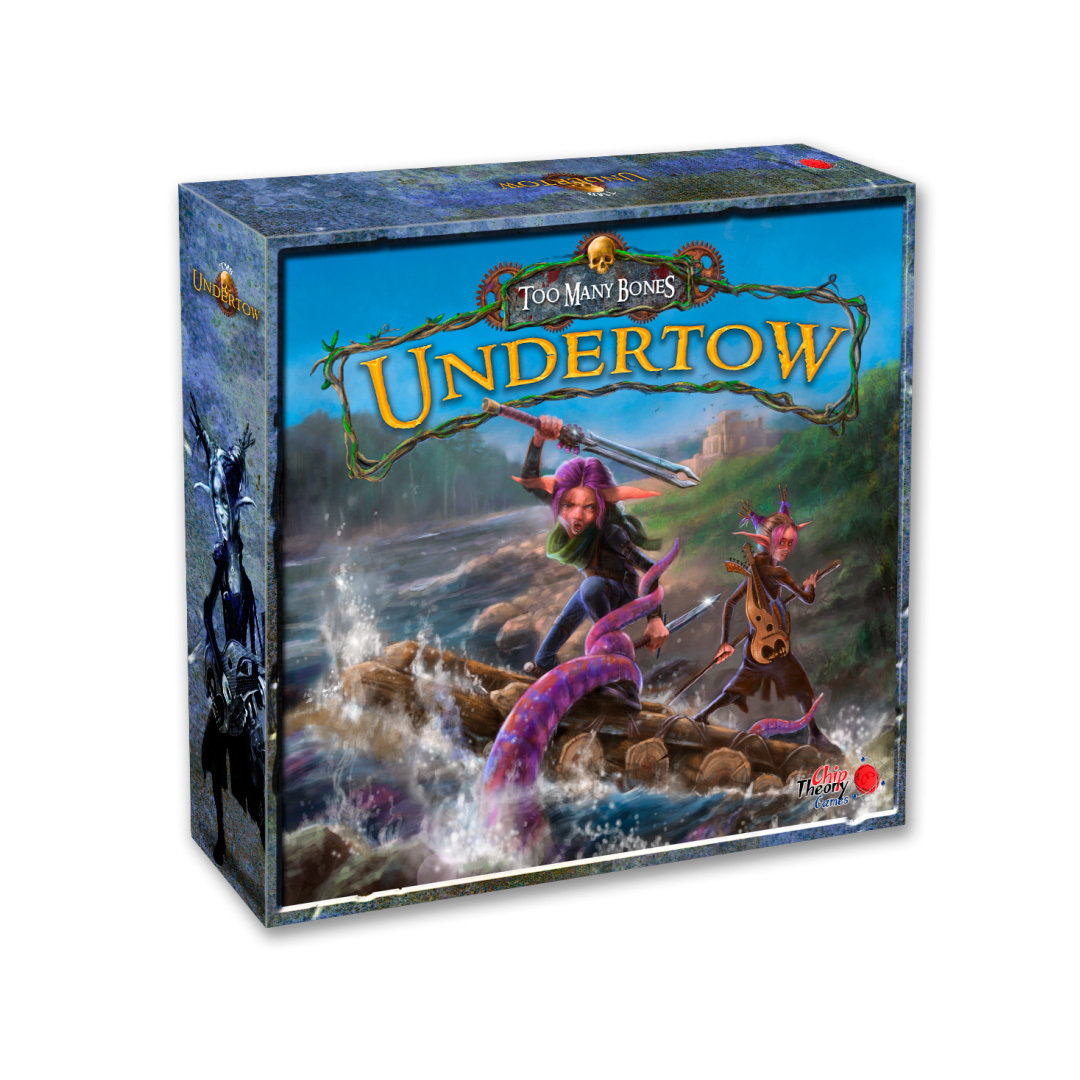
Too Many Bones: Undertow
Available: Preorders from the publisher ship this Summer.
A standalone expansion to last year’s Too Many Bones, Too Many Bones: Undertow from Chip Theory Games has the same RPG appeal and outrageous component quality of the base game. A cute little tactical RPG, Undertow uses custom dice and character playmats to replicate the experience of a game like Final Fantasy Tactics using a dice pool for your character, rather than a big character sheet. That’s not to say you don’t have one, since the game comes with fancy mats that your dice slot into in the style of a vanilla World of Warcraft talent tree. (Seriously, the component quality on this game is insane. Stitched edge neoprene player mats. Printed dice and chips. Even the cards are plastic. You could literally play it underwater.)
All of this is to undertake little quests across a larger world map, moving from place to place and fighting enemies in order to take down one of a few bosses. The fights are clever, using poker-style chips in place of miniatures on a tactical grid. If you were interested in the base game but scared off by the price, Too Many Bones: Undertow might be a good entry point for you. If you really like over the top, epic board game experiences: Stop here, nothing on this list can top it.
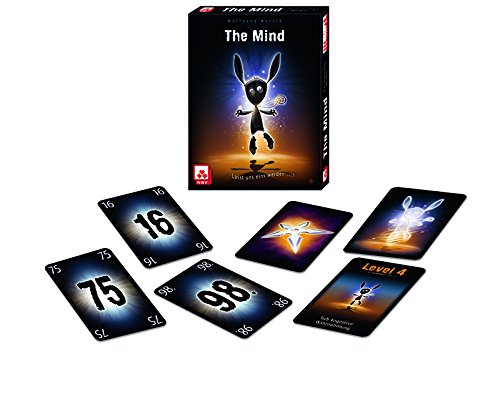
The Mind
Available: Now.
Definitely my candidate for most surprising game of show, cooperative card game The Mind may just be my new favorite “numbers on cards” game. It’s incredibly simple: Each round you draw some cards from a deck containing the numbers one to one hundred. Then, without communicating at all with the other players or seeing their cards, you place those cards down on the table in ascending order. As you succeed, you draw larger and larger hands of cards. As you fail, you lose lives, and you can make a number of mistakes up to the number of players. That’s it. That’s the game.
It’s simple, quick, and surprisingly fun. It does not sound fun, to describe it, but it is very fun. It’s a game of true communication, of getting to know the subtle timing and body language of those around you, and of true cooperation. As someone else very astutely pointed out to me: It’s a true co-op game like tabletop favorite Hanabi. You can’t play it without other people, and you can’t play the game for them like Pandemic or Forbidden Island: You must succeed or fail together.
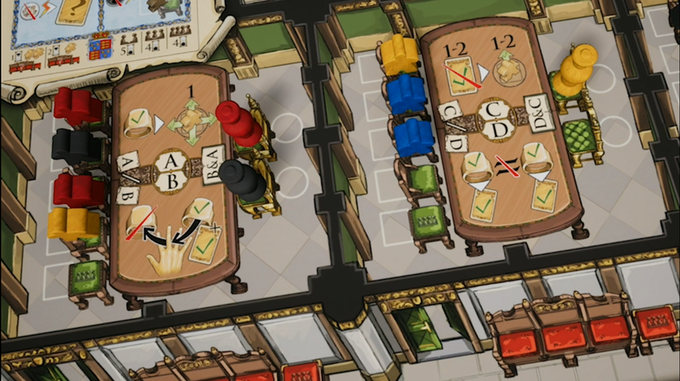
Tudor
Available: October 2018.
From historical gaming masters Academy Games comes Tudor, a worker placement game by newcomer designer Jan Kirschner that was just funded on Kickstarter. In the game, players are members of the royal court of England under Henry VIII, where they must maneuver their family into influential positions of power. The neat thing about the game is that it’s laid out like the court itself, meaning you literally track power and prestige by where your pieces sit in the throne room and at the audience tables of powerful lords. You literally accrue little rings in the game to symbolize your positions of prestige, and you place those rings on a big hand on your player screen to boost the power of your actions. There’s not much more satisfying than claiming another player’s office and demanding their ring.
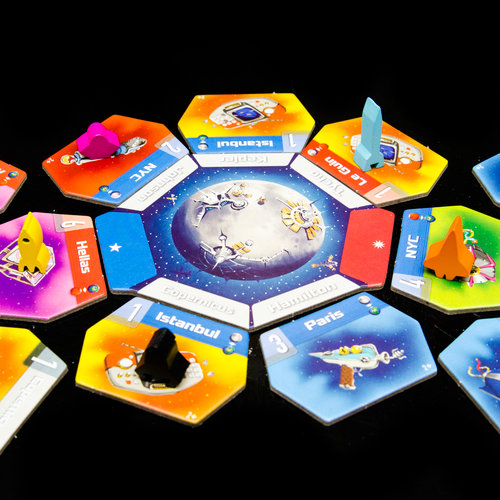
Junk Orbit
Available: In stores June 27, online July 11th.
I’m all about some interstellar trash, and being the captain of a garbage scow in the stars is a dream come true. At least it is in Junk Orbit, a clever, puzzling little pick-up-and-deliver game from Renegade Game Studios and designer Daniel Solis. Each round you launch a piece of space trash from your ship, moving orbitally around a planet based on the weight of the junk you threw. Once you land at a location you drop off cargo that needs to go there to score points, then pick up whatever junk has accumulated there. The junk you launch for propulsion also lands somewhere, meaning that you can deliver junk by using it for fuel. These simple steps quickly become a puzzle where each round you try to both deliver by propulsion and movement, then pick up things for destinations along your route as you zip from Earth to Mars and back, turning trash into treasure.
Did I mention that you can hit other people with your thrown junk to make them lose points? You can do that too.
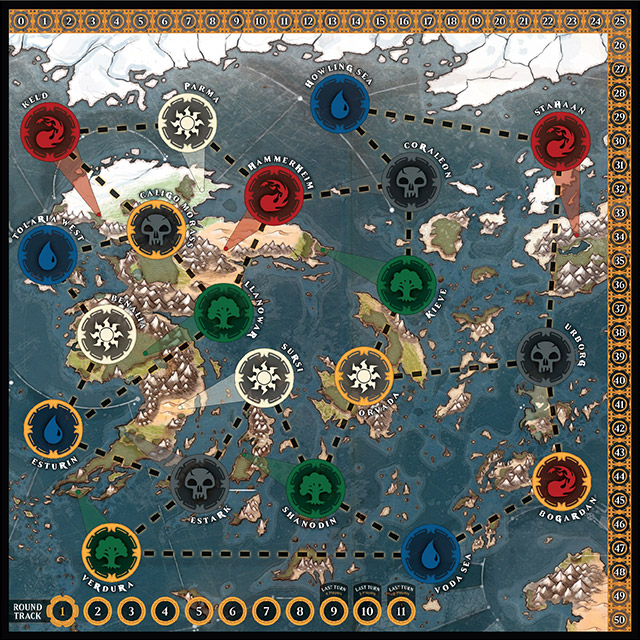
Heroes of Dominaria
Available: July 2018.
Magic: The Gathering’s return to its ur-setting after years away has been a welcome twist for many of us, and I can’t say that Heroes of Dominaria doesn’t tickle that nostalgia fancy in a way that I love. A board game from WizKids, this game has you travelling to famous MtG locations in order to stop the Cabal and save the multiverse. Really, though, it’s a tabletop adventure game about skipping from place to place and putting things there or picking them up. There’s not a lot of exceptional or unique design work at play here, but it is a fun game with a flavorful resource mechanic based around gathering mana from Magic’s different land types by literally traveling there. A serviceable adventure game with a Magic: The Gathering twist, which might not be enough for everyone, but it was enough for me to recommend it to the interested.
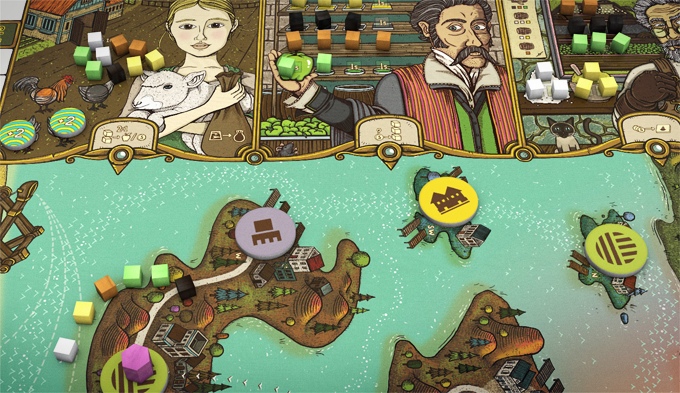
And the others...
Plenty of other interesting games were at Origins this year, and I’d be remiss if I didn’t let you know about some of them. Steve Jackson Games’ Munchkin CCG is a clever twist on the familiar, and better than I thought it’d be. Carthago was a neat strategy game of card management and goods trading. End of the Trail was a gold rush-themed game all about finding and exploiting gold, with a twist requiring players to play stud poker with the action cards they played each round. Cytosis was a game about the processes of the cell using real science, so instead of placing workers for bricks, you’re placing them for mRNA or Carbohydrates to form Enzymes and Hormones. Finally, Feudum was a heavy game of hand and resource management with a lovely, whimsical modern fantasy art touch.
Jon Bolding is a games writer and critic with an extensive background in strategy games. When he's not on his PC, he can be found playing every tabletop game under the sun.

